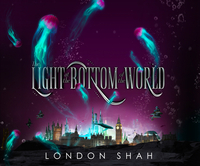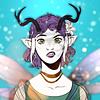Take a photo of a barcode or cover
Really a solid 3 1/2 stars. Looking forward to the next installment.
4.5*
This book is a bit of a conundrum to me. I'm giving it such a high rating because of the pure enjoyment factor. I flew through this book in a single sitting which I usually never do.
I was simply having such a fun time. It felt like a movie that, objectively, you know isn't very good but you simply cannot help but watch it every now and then.
The plot was extremely predictable from the start. People should really not expect any grand plot-twists going into this book .
Furthermore, there's insta-love. DUN.DUN.DUUUN!!! I might be a little bit dramatic but i usually hate insta-love. For some reason, though, it didn't bother me very much in this book. Probably, because - like I already mentioned - I read this book as a turn-off-your-brain-get-some-popcorn-and-just-enjoy-the-show kind of book.
The underwater-setting was actually very interesting to read about & not something I've seen done often before. So, points for unique setting.
The ending was quite exciting and fast-paced!
This book is a bit of a conundrum to me. I'm giving it such a high rating because of the pure enjoyment factor. I flew through this book in a single sitting which I usually never do.
I was simply having such a fun time. It felt like a movie that, objectively, you know isn't very good but you simply cannot help but watch it every now and then.
The plot was extremely predictable from the start. People should really not expect any grand plot-twists going into this book .
Furthermore, there's insta-love. DUN.DUN.DUUUN!!! I might be a little bit dramatic but i usually hate insta-love. For some reason, though, it didn't bother me very much in this book. Probably, because - like I already mentioned - I read this book as a turn-off-your-brain-get-some-popcorn-and-just-enjoy-the-show kind of book.
The underwater-setting was actually very interesting to read about & not something I've seen done often before. So, points for unique setting.
The ending was quite exciting and fast-paced!
I like reading characters that dare to hope against the crushing abyss of darkness. And the setting is to my liking. But the story felt like a combination of books I have read before. With not a lot of surprise along the day. The book would probably been better to me if it was my first dystopian YA.
Also: Please walk the dog! :D
Also: Please walk the dog! :D
I’ve been remiss in posting about The Light at the Bottom of the World. Loved this book! London Shah has created something special with this story. The setting is great, the plot is well-constructed, and the characters are authentic. The subject matter is timely, and Shah avoids getting too heavy-handed with it while making her point. There’s a bit of a cliffhanger at the end that’s an obvious setup for the next book, but otherwise this novel stands on its own. I went back-and-forth from the audiobook and ebook, so I also want to give Shiromi Arserio some praise. She does a fantastic job reading this book, which is available on Spotify.
adventurous
hopeful
medium-paced
Plot or Character Driven:
Plot
Strong character development:
No
Loveable characters:
Complicated
Diverse cast of characters:
Yes
I didn’t expect to love this book as much as I did. The premise is intriguing, the writing is beautiful and the world building so vivid!! The ending has me wanting to read book 2 as soon as possible.
It's 2099. Earth's oceans have risen and humanity can no longer survive above the surface of the water. Leyla lives in undersea London. She loves to race submersibles, and gets picked to participate in London's annual marathon. Her father's been imprisoned, and the prize for winning the marathon may give her a way to get him home.
I loved the way Shah imagines an underwater future. There's a lot of technology, of course, but also ruins of civilization that track with real British geography.
It's mostly a roadtrip/adventure story in a speculative dystopic future. Lots of world-building appeal. Plus some hetero romance.
This kept me up reading late into the night. Good stuff. I especially appreciated the representation of a future that incidentally features Muslim main characters. I'm planning to take it to middle schools, and maybe high schools too.
I loved the way Shah imagines an underwater future. There's a lot of technology, of course, but also ruins of civilization that track with real British geography.
Spoiler
Some of the plot felt a little thin - that rescue at the end felt too easy and the romantic power dynamic felt a little sketch to me.It's mostly a roadtrip/adventure story in a speculative dystopic future. Lots of world-building appeal. Plus some hetero romance.
This kept me up reading late into the night. Good stuff. I especially appreciated the representation of a future that incidentally features Muslim main characters. I'm planning to take it to middle schools, and maybe high schools too.
adventurous
mysterious
medium-paced
Plot or Character Driven:
A mix
Strong character development:
Yes
Loveable characters:
Yes
Diverse cast of characters:
Yes
Flaws of characters a main focus:
No
adventurous
lighthearted
reflective
fast-paced
Plot or Character Driven:
Character
Strong character development:
Yes
Loveable characters:
Yes
Diverse cast of characters:
Yes
Flaws of characters a main focus:
Yes
I was trying to get into this—the plot sounded interesting, but there was just too much awkwardness and lack of connection with the main character, Leila. It was the line, “I shan’t stop asking questions...” this is a teenager talking. It was also hard for me to suspend my disbelief at the flooded world and how they managed to build it, have electricity, etc. when nothing is above water.









